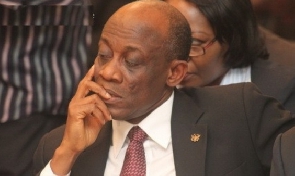 Seth Terkper, Finance Minister
Seth Terkper, Finance Minister
The Industrial and Commercial Workers Union (ICU) has raised concerns over the need for the government to immediately take steps to prevent the country from its worsening debt situation.
Figures from the Bank of Ghana shows the country’s total public debt stands at GH¢112.4 billion as of September 2016 which translates into about 67.4 per cent of GDP.
Between January and September this year, more than GH¢13 billion has been added to the total public debt stock which stood at GH¢98.8 billion in January.
This development places Ghana on the path of meeting the International Monetary Fund’s projection of a 66 per cent debt-to-GDP by the of the year.
Government debt as a per cent of GDP is used by investors to measure a country’s ability to make future payments on its debt, thus affecting that country’s borrowing costs and government bond yields. General Secretary ICU Solomon Kotei says it is imperative for government to put in place measures that will prevent total collapse of the economy.
“The question is when are we going to see a stop? Have we become perpetual debt building nation and what are the impact of some of these loans? Some of these loans that we are taking when the payment begins we may have to sacrifice some of our important resources like cocoa, oil etc. to service the loans,” he noted.
He wondered when Ghanaians will see relief in their lives, adding “We should not just take the joy and pleasure to always borrow because when we borrow with control over the payment it doesn’t mean well for our country” The national debt keeps increasing.
Total public debt as a percentage of GDP between 2014 and 2016 July has been fluctuating between the 60 per cent and 73 per cent.
As of July 2016, the debt to GDP ratio stood at 65.9 per cent. The phenomenon is largely attributed to the lack of fiscal discipline where government expenditure consistently exceed its revenue.